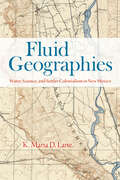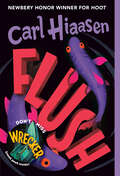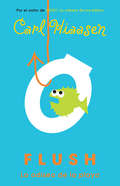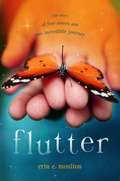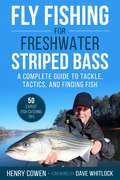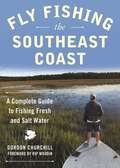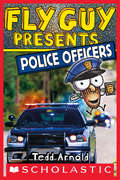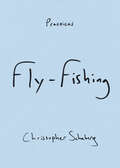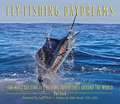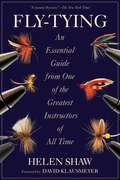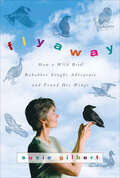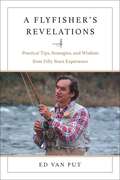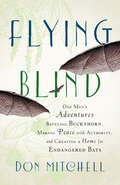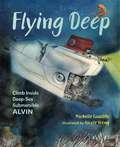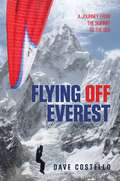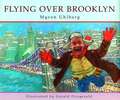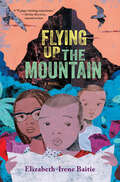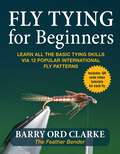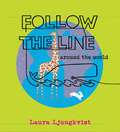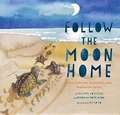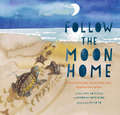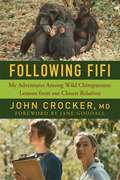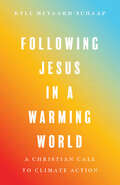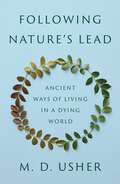- Table View
- List View
Fluid Geographies: Water, Science, and Settler Colonialism in New Mexico
by K. Maria LaneAn unprecedented analysis of the origin story of New Mexico’s modern water management system. Maria Lane’s Fluid Geographies traces New Mexico’s transition from a community-based to an expert-led system of water management during the pre-statehood era. To understand this major shift, Lane carefully examines the primary conflict of the time, which pitted Indigenous and Nuevomexicano communities, with their long-established systems of irrigation management, against Anglo-American settlers, who benefitted from centralized bureaucratic management of water. The newcomers’ system eventually became settled law, but water disputes have continued throughout the district courts of New Mexico’s Rio Grande watershed ever since. Using a fine-grained analysis of legislative texts and nearly two hundred district court cases, Lane analyzes evolving cultural patterns and attitudes toward water use and management in a pivotal time in New Mexico’s history. Illuminating complex themes for a general audience, Fluid Geographies helps readers understand how settler colonialism constructed a racialized understanding of scientific expertise and legitimized the dispossession of nonwhite communities in New Mexico.
Flush
by Carl HiaasenA hilarious, high-stakes adventure involving crooked casino boats, floating fish, toxic beaches, and one kid determined to get justice. This is Carl Hiaasen's Florida—where the creatures are wild and the people are wilder! You know it's going to be a rough summer when you spend Father's Day visiting your dad in the local lockup.Noah's dad is sure that the owner of the Coral Queen casino boat is flushing raw sewage into the harbor–which has made taking a dip at the local beach like swimming in a toilet. He can't prove it though, and so he decides that sinking the boat will make an effective statement. Right. The boat is pumped out and back in business within days and Noah's dad is stuck in the clink.Now Noah is determined to succeed where his dad failed. He will prove that the Coral Queen is dumping illegally . . . somehow. His allies may not add up to much–his sister Abbey, an unreformed childhood biter; Lice Peeking, a greedy sot with poor hygiene; Shelly, a bartender and a woman scorned; and a mysterious pirate–but Noah's got a plan to flush this crook out into the open. A plan that should sink the crooked little casino, once and for all.
Flush: La odisea de la playa
by Carl HiaasenUna divertida aventura en la que encontraremos un barco-casino deshonesto, peces flotantes, playas tóxicas y un adolescente decidido a hacer justicia. Esta es la Florida de Carl Hiaasen, ¡donde las criaturas son salvajes y la gente todavía más! Te das cuenta de que va a ser un verano difícil cuando pasas el Día del Padre visitando a tu papá en la cárcel. El padre de Noah está seguro de que el dueño del barco-casino Coral Queen está tirando desperdicios en las aguas del puerto, lo que ha hecho que darse un chapuzón en la playa local sea igual que nadar en un inodoro. Sin embargo, no puede comprobarlo, por lo que decide que hundir el barco será una declaración efectiva. Sí, claro. En pocos días sacaron el barco del agua, lo vaciaron y volvió a funcionar sin problemas, pero el padre de Noah sigue atrapado en el calabozo. Ahora Noah está decidido a triunfar donde su padre falló. Demostrará, de alguna manera, que el Coral Queen está vaciando su tanque de desperdicios ilegalmente. Es posible que sus aliados no aporten mucho: su hermana Abbey, que ha mordido desde la infancia y no se ha podido corregir; el Piojo Peeking, un borrachín codicioso con poca higiene; Shelly, una cantinera despechada; y un pirata misterioso… Pero Noah tiene un plan para sacar a la luz al villano. Un plan que debería hundir el pequeño casino deshonesto de una vez y por todas.
Flutter: The Story of Four Sisters and an Incredible Journey
by Erin MoultonBig things are about to happen at Maple's house. Mama's going to have a baby, which means now there will be four Rittle sisters instead of just three. But when baby Lily is born too early and can't come home from the hospital, Maple knows it's up to her to save her sister. So she and Dawn, armed with a map and some leftover dinner, head off down a river and up a mountain to find the Wise Woman who can grant miracles. Now it's not only Lily's survival that they have to worry about, but also their own. The dangers that Maple and Dawn encounter on their journey makes them realize a thing or two about miracles-and about each other. .
Fly Fishing for Freshwater Striped Bass: A Complete Guide to Tackle, Tactics, and Finding Fish
by Henry CowenHere fishing guide and fly designer Henry Cowen shares decades of hard-earned knowledge of stripers for the first time. Learn about the species, its food, and where and how to find them, so you can land far more and bigger stripers. Knowing where and how to find stripers is key, and Cowen offers proven techniques for locating fish in both reservoirs and rivers, including water temperature, seasonal patterns, weather patterns, locating the bait, water clarity, and wildlife and how it can help anglers. The popularity of fishing for striped bass in freshwater is growing quickly, especially as global warming allows the fish to live in waters that used to be too cold. This is the first major book on the subject, one that is sure to be part of a big trend among fly fishers. Cowen carefully outlines fishing tactics, along with detailed photographs of the steps involved, covering:Retrieving a striperFishing a point, uphill and downhillWorking a topwater fly (constant retrieve)Hooking a fish (strip strike)Fishing a humpFishing a saddle or blow-throughFishing a breakwaterUsing the countdown methodFishing a deep hole in a riverFishing a creek in a riverAnd much more!Cowen also takes a close look at freshwater striped bass, explaining how natural and stocked fisheries are managed as well as the difference between the various species. Along with help choosing equipment and some notes on wading tactics, anglers will have everything they need to improve their fishing techniques or make a start on this popular all-American outdoor sport.
Fly Fishing the Southeast Coast: A Complete Guide to Fishing Fresh and Salt Water
by Gordon Churchill Rip WoodinGordon Churchill has been an enthusiastic angler all of his life, ever since he was little and would go fishing with his father in the lakes of upstate New York. Churchill shares his tips, tricks, and passion for fishing in Fly Fishing the Southeast Coast. Learn that you don’t have to travel to Bahamas or any other far exotic island to find the perfect catch. Many ideal places are right here in the US, including Pamlico Sound, North Carolina, and St. Augustine, Florida.In order to fly fish successfully, a fisherman must know what kind of species they want, what rod and line combo works best, what flies to stock, and of course when and where to be.For each chapter, Churchill gives advice on where to find specific species of fish, from the Striped Bass in the southeast region of the Roanoke River to Mahi Mahi in the Gulf Stream, forty miles off of Morehead City, North Carolina, as well as specifics on the approach of catching each species, as they’re all quite different. While full of tips and advice, Churchill makes it clear that, if ever fishing on the coast, you must be involved in a conservation effort. The environment and fish are constantly in danger, so make sure to always be aware and put your planet first!
Fly Guy Presents: Police Officers (Scholastic Reader, Level 2 #11)
by Tedd ArnoldFly Guy is buzzing over to the police station to learn all about police officers!Fly Guy and Buzz are visiting a police station on their latest field trip. They will learn all about police officers: job duties and responsibilities, police dogs, uniforms, police cars, community policing, police stations, police chiefs, police academies, detectives, and even how and when to use 9-1-1. There's so much to learn about these important community helpers! Award-winning author-illustrator Tedd Arnold brings nonfiction to life for beginning readers. There are humorous illustrations and engaging photographs throughout. The front cover features eye-catching holographic foil!
Fly-Fishing (Practices)
by Christopher SchabergIn Fly-Fishing, Christopher Schaberg ponders his lifetime pursuit of the widely mythologized art of fly-fishing. From the Michigan lakeshore where he learned to fish to casting flies in a New Orleans bayou, Schaberg sketches landscapes and fish habitats and shows how fly-fishing allows him to think about coexisting with other species. It offers Schaberg a much-needed source of humility, social isolation, connection with nature, and a reminder of environmental degradation. Rather than centering fishing on trophies, conquest, and travel, he advocates for a “small-fishing” that values catching the diminutive fish near one’s home. Introspective and personal, Fly-Fishing demonstrates how Schaberg’s obsession indelibly shapes how he understands and lives in the wider world.
Fly-Fishing Daydreams: The Most Exciting Fly-Fishing Adventures Around the World
by Lefty Kreh Mike Myatt Pat FordFrom Alaska to the Bahamas, Panama to The Seychelles, Pat Ford knows where to find the best places to go fly fishing. In Fly-Fishing Daydreams, Ford and his camera capture the most exciting adventures in the sport, from great sailfishing expeditions in Guatemala to Atlantic salmon-finding missions on the icy waters of Russia’s Kola Peninsula. In each far-flung locale, Ford recounts his unforgettable fish tales and illuminates them with spectacular full-color photography, putting the reader right there in their waders beside him. The result is a book that enables readers to live out their fly fishing dreams. Complete with 300 full-color photographs, a foreword by legendary fly fisherman and author Lefty Kreh, a preface by Mike Myatt, chief operating officer of the International Game Fish Association (IGFA), and a special chapter on digital photography basics for anglers, Fly-Fishing Daydreams is a book no lover of fly fishing should be without.
Fly-Tying: An Essential Guide from One of the Greatest Instructors of All Time (Lyons Press Ser.)
by David Klausmeyer Helen ShawNo book has taught-or retaught-more serious fly tiers the basic skills of fly tying than Helen Shaw's Fly-Tying. Shaw's simple and logical prose throughout and more than 250 life-size tying sequences make the various processes easy to understand, follow, and apply.Readers of Fly-Tying will learn every skill necessary to tie flies using many different materials, including:ThreadTinselFlossWoolDubbingHairQuillFeathersIntroductory chapters teach aspiring fly tiers about the tools of the trade, while a chapter titled "The Finished Fly" explains how to use what they have created. Learning the various techniques one-by-one throughout the text will help fly tiers of all backgrounds and levels of expertise to tie hundreds of different patterns.With a new color photo insert, foreword by David Klausmeyer, and note from Nick Lyons, a whole new generation of tiers will benefit from the reintroduction of this authoritative book more than fifty years after its original publication in 1963.
Flyaway: How A Wild Bird Rehabber Sought Adventure and Found Her Wings
by Suzie Gilbert“A delightful must-read…. It charms, delights, and educates while providing a fascinating tale of love and devotion to the feathered creatures that share our increasingly crowded world.” — Joanna Burger, author of The Parrot Who Owns Me“Gilbert’s ethics and talent for writing have made her the perfect author to bring the world of wildlife rehabilitation to the reader.” — Wilson JournalIn this captivating memoir, Suzie Gilbert tells the rollicking story of how she turned her family life upside down to pursue her unusual passion for rehabilitating wild birds. Fans of Michael Pollan, James Herriot, and Elizabeth Marshal Thomas are sure to find much to cherish in Flyaway.
Flyfisher's Revelations: Practical Tips, Strategies, and Wisdom from Fifty Years Experience
by Ed Van PutA FLYFISHER'S REVELATIONS is a captivating and provocative practical memoir, long awaited by legions of the author's fans. Ed has been a passionate and highly successful fly-fisherman and conservationist for more than half a century. Now, drawing on decades of carefully kept diaries and journals, his book is both the chronicle of a life devoted to fly-fishing and a unique sharing of detailed tips, tactics, strategies, and personal anecdotes that reveal why he has earned the reputation for unparalleled successes. He tells which flies have produced most effectively; how to choose and tie flies that work best; when and how to fish the dry or wet fly, nymph, midge, or streamer; the importance of approach and presentation. There is a special chapter on the Adams, his favorite fly and one on which he has taken more than 70% of the trout he caught on a dry fly. He also offers insight into the beauty, humility, and quiet rewards of a life spent in the embrace of nature and the pursuit of wild trout. This book is an essential read for all fly-fishers, novice and advanced.
Flying Blind: One Man's Adventures Battling Buckthorn, Making Peace with Authority, and Creating a Home for Endangered Bats
by Don MitchellWhen Middlebury writing professor Don Mitchell was approached by a biologist with the Vermont Fish and Wildlife Department about tracking endangered Indiana bats on his 150-acre farm in Vermont's picturesque Champlain Valley, Mitchell's relationship with bats—and with government—could be characterized as distrustful, at best.But the flying rats, as Mitchell initially thinks of them, launched him on a series of "improvements" to his land that would provide a more welcoming habitat for the bats—and a modest tax break for himself and his family. Whether persuading his neighbors to join him on a "silent meditation," pulling invasive garlic mustard out of the ground by hand, navigating the tacit ground rules of buying an ATV off Craigslist, or leaving just enough honeysuckle to give government inspectors "something to find," Mitchell&’s tale is as profound as it is funny—a journey that changes Mitchell&’s relationship with Chiroptera, the land, and, ultimately, his understanding of his own past.Ruminating on the nature of authority, the purview of the state, and the value of inhabiting one&’s niche—Mitchell reveals much about our inner and outer landscape, in this perfectly paced and skilled story of place.
Flying Deep: Climb Inside Deep-Sea Submersible Alvin
by Michelle CusolitoClimb aboard Alvin, the famous deep-sea submersible credited with helping to find the Titanic, and take a trip two miles down to the bottom of the ocean.Experience a day in the life of an Alvin pilot and join scientists at the seafloor to collect samples and conduct research. Along the way, discover what one wears, eats, and talks about during a typical eight-hour trip in a underwater craft and find out more about the animals that live deep in our oceans. Extensive back matter explains how Alvin works, describes the author's research, and includes a glossary and further reading."An appealing, exhilarating, and informative vicarious journey of discovery" —Kirkus Reviews, STARRED REVIEW"Wong&’s detailed illustrations add an exciting immediacy to the descent and to the glowing wonders of the deep&”—Washington Post
Flying Off Everest: A Journey from the Summit to the Sea
by Dave CostelloPerched impossibly on a ridge overlooking a 10,000-foot drop into Tibet, Sano Babu Sunuwar and Lakpa Tsheri Sherpa wait. Heel to toe, connected at the waist by a pair of carabineers that’s connected to nothing else, they stare down the North Face of Mount Everest, a red and white nylon tandem paragliding wing fluttering behind them. They know that jumping off the top of the world marks only the beginning of a longer, more audacious journey. And they know that the two-mile ride down Everest will be the easiest part. If the jump doesn’t kill them.In April 2011 the two unsponsored Nepalis set out on an unprecedented expedition to climb Everest, paraglide from its peak, and paddle nearly 400 miles to the ocean. Little problems wouldn’t stop them. Like the fact that Babu had no technical climbing experience. And that Lakpa had never been kayaking—or swimming. But after summiting, surviving their flight off the world’s tallest mountain, and being arrested, robbed, and nearly drowned—repeatedly—the two friends discovered their adventure had only just begun.
Flying Over Brooklyn
by Myron UhlbergA magical story of how a young boy's everyday world is transformed into a snow-covered wonderland through the force of a blizzard and the power of a dream A YOUNG BOY trudges through deep snow in a neighborhood park. Suddenly a strong wind grabs his coat and lifts the child up into the air. Soon the boy is soaring high above his strangely silent, snow-covered neighborhood. As he flies over familiar sites--a bridge over a frozen river, a baseball field, and an amusement park--he gains a new perspective on the world around him. The boy's airborne adventure provides a magical--if temporary--escape from the routine of everyday life. In the end the boy returns to the safety of his home and family, but is left wondering: Was it all just a marvelous dream or did it really happen? Author Myron Uhlberg's story is based in part on his own childhood memories of the Great Blizzard of 1947 which blanketed Brooklyn and the surrounding area under several feet of snow. An author's note at the back of the book provides details about the snowstorm and places this fantasy in its historical context. Illustrator Gerald Fitzgerald's two-page, gently softened illustrations beautifully evoke the story's nostalgia and dreamlike quality.
Flying Up the Mountain: A Novel
by Elizabeth-Irene BaitieThe companion to Crossing the Stream is a moving story of friendship and a timely reminder of our duty to nature. Ato and his friends Dzifa and Leslie have been selected to visit Nnoma, the bird sanctuary that Ato’s father helped build before he died. Ato is convinced that his father hid something valuable on the island, meant only for him. When the trio arrives at Nnoma with other children from across West Africa, they are split into teams and given missions to help broaden their knowledge of nature. The winners will become Asafo—ambassadors of Nnoma and defenders of the Earth. But then the adults running Nnoma start behaving erratically and Ato suspects foul play. When the trio uncovers a sinister plot to exploit the sanctuary, Ato and his friends must work together to protect it—and his father’s legacy. Kirkus praised Crossing the Stream as “a powerful coming-of-age story of self-discovery” in their starred review. Now, Flying Up the Mountain calls upon each of us to do our part in safeguarding our planet.
Flytying for Beginners: Learn All the Basic Tying Skills via 12 Popular International Patterns
by Barry Ord ClarkeThis is a guide book for those totally new to the art of tying flies. Until now, learning flytying from a book has not only been challenging, but often the cause of great frustration, with photographs or diagrams making even the elementary techniques difficult to grasp. Step-by-step images help a reasonably proficient flytyer understand the stages in making a fly, but for the new beginner, there will always be a gap between each step-by-step image, which can be bewildering. Seeing the manual maneuvers that take place in these pages can make the different between success and failure for a beginner. The techniques you will learn in this book are the building blocks for which all successful fishing flies, even the most complex ones, are based.
Folklore of American Weather
by Eric SloaneIn preparing this unusual book of American weather sayings and beliefs, Eric Sloane has made a painstaking effort to separate the true from the false, investigating origins and separating the many truly valuable pieces of weather lore from superstition, or what he calls "jackass jingles." As Mr. Sloane makes clear, folklore can be a very loose term used to cover a lack of knowledge of the very thing that folklore means: many things are passed off as folklore that are plain mistakes or inventions. Following general introductory remarks, Mr. Sloane has arranged his findings in an alphabetical folklore dictionary, enabling the reader to find readily the signs involving stars, wind, dew, rain, or whatever else he wishes. After each entry is a symbol indicating whether it is true (T), false (F), or possible (P). Thirty-five drawings by the author clarify and enhance the text of this entertaining and informative new book by America's favorite weather expert.
Follow the Line Around the World
by Laura LjungkvistFollow the line from the camels of the Sahara Desert to the blue whales of Greenland, from the giraffes of Kenya?s grasslands to the kangaroos of Australia?s Outback. This new Follow the Line book?illustrated in Laura Ljungkvist?s signature line style?takes young children around the world to see animals in their natural habitats. With informative facts and a gentle environmental message, Follow the Line Around the World is sure to appeal to those interested in taking better care of the earth.
Follow the Moon Home: A Tale of One Idea, Twenty Kids, and a Hundred Sea Turtles
by Deborah Hopkinson Philippe Cousteau<P>Acclaimed activist Philippe Cousteau and renowned author Deborah Hopkinson team up to offer a story of the powerful difference young people can make in the world. <P>Meet Viv, who has a new home and a new school by the sea, and follow her as she finds her way in a new place and helps bring together a whole community to save the sea turtles of the South Carolina coast.
Follow the Moon Home: A Tale of One Idea, Twenty Kids, and a Hundred Sea Turtles
by Deborah Hopkinson Philippe CousteauAcclaimed activist Philippe Cousteau and renowned author Deborah Hopkinson team up to offer a story of the powerful difference young people can make in the world. Meet Viv, who has a new home and a new school by the sea, and follow her as she finds her way in a new place and helps bring together a whole community to save the sea turtles of the South Carolina coast. Plus, this is the fixed format version, which looks almost identical to the print edition.
Following Fifi: My Adventures Among Wild Chimpanzees: Lessons From Our Closest Relatives
by Jane Goodall John CrockerAn exhilarating quest into a remote African forest to examine chimpanzees and understand the roots of human behavior. As a young student, John Crocker embarked on the adventure of a lifetime, spending eight months in the Gombe forest working with Jane Goodall. He followed families of wild chimpanzees from sunrise to sunset and learned the fundamental behavioral traits of these chimps as they raised their offspring. One chimpanzee captivated him. Her name was Fifi, and she displayed extraordinary patience and reassurance toward her infant, Freud. Upon returning home and becoming a doctor, Crocker found himself incorporating the lessons he learned from Fifi into his work as a father and physician. When he witnessed his young patients rocketing around his exam room, he would picture Fifi’s patience and tacit approval of Freud’s uninhibited and joyful exploration. Crocker shares how his time spent with our closest animal cousins has helped him better understand his patients with ADD, anxiety, and depression, and how primate traits hardwired into our own natural behavior help chimpanzees protect their community, raise their young, and survive. Finally, chronicling his return to Gombe thirty-six years later with his own son, he reflects on how his experience with the chimps has come full circle. An illuminating book that will raise thought-provoking questions about the evolution of human behavior and the importance of patience and strong family bonds, Following Fifi provides a greater understanding of what it means to be human.
Following Jesus in a Warming World: A Christian Call to Climate Action
by Kyle Meyaard-SchaapHave you ever looked at the effects of climate change and the apathy of so many around you and wondered, "What are we missing here?" Climate activist Kyle Meyaard-Schaap understands this feeling from personal experience. But in his years of speaking to and equipping Christians to work for climate action, he's seen the trend begin to shift. More and more young Christians are waking up to the realities of climate change. They want to help, but they're not sure how. Through stories from the field, theological and scriptural exploration, and practical advice, Meyaard-Schaap offers hope to Christians paralyzed by the scale of the crisis, helping us turn our paralysis into meaningful action. Following Jesus in a Warming World is a field guide for Christian climate action—one grounded not in a sense of guilt or drudgery, but in the joy of caring for creation.
Following Nature’s Lead: Ancient Ways of Living in a Dying World
by M. D. UsherIn the spirit of E. F. Schumacher&’s Small Is Beautiful, a dazzling and revelatory exploration of what ancient ideas and ways of living can teach us about creating a more sustainable worldHow should we think and live in a world facing environmental catastrophe? In this urgent, original, and wide-ranging book, classicist and farmer M. D. Usher brings together ancient, indigenous, and modern ideas about how to live in this world and describes how we might begin to reconnect with Nature and heal our damaged planet and lives. The ancients hewed close to Nature, the source of their survival, in ways that most of us can scarcely conceive of today, and ancient philosophy often argues that humans should follow Nature&’s lead. Usher makes the case that Nature&’s resilience can serve as a model for our own responses to climate trauma and all the other harms caused by modern lifestyles.Drawing on philosophy, science, economics, art, literature, history, and religion, Following Nature&’s Lead is both an indictment of human overreach and a celebration of human ingenuity and the adaptability of Nature. Here, Plato meets German biologist Jakob von Uexküll, Lucretius illuminates King Lear, and Diogenes the Cynic crosses swords with Henry Thoreau.Filled with vital and inspiring insights, Following Nature&’s Lead shows how the ancients can help teach us to live in accordance with Nature—and why it&’s essential for human survival that we learn to do so without delay.
